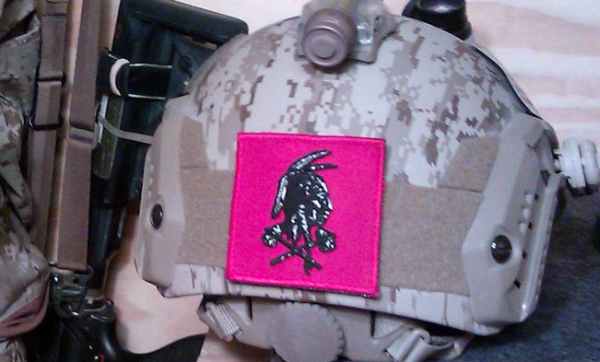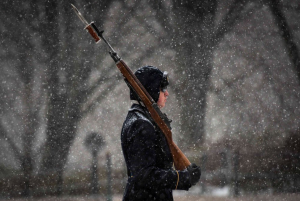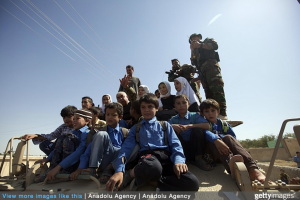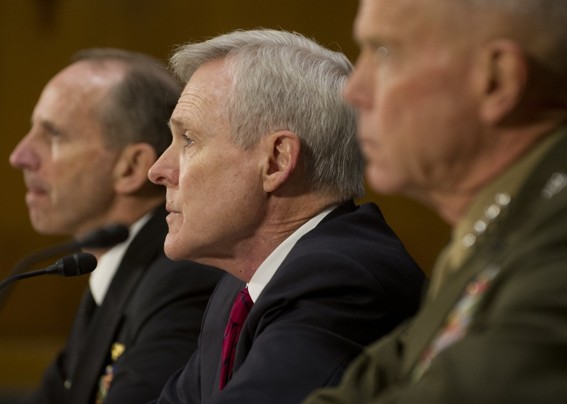
Credit: The Shooter
Phil Bronstein, executive chairman of the Center for Investigative Reporting, wrote an amazing article in conjunction with Esquire. The piece is a profile on the man who killed the most wanted terrorist of our time — Osama bin Laden – but is also a chilling portrait of what happens to these super-elite soldiers once they’ve accomplished their mission. Bronstein writes about his first interaction with man to whom he refers as “the shooter:”
This was my first face-to-face meeting with the Shooter, following several phone conversations and much checking on my journalism background, especially in war zones. In a corner, pouring drinks, he and I established some rules. He would consider talking to me only after his last, upcoming four-month deployment to Afghanistan had ended and he had exited the Navy. And he would not go public; he would not be named. That would be counter to the team’s code, and it would also put a huge “kill me” target on his back.
The resulting article is a fascinating insight into this most historic raid, from which they thought they’d never return:
We all wrote letters. I had my sh-tty little room and I’m sitting on my Pelican case with all my gear, a manila envelope on my bed, and I’m writing letters to my kids. They were to be delivered in case of my death, something for them to read when they’re thirty-five. I have no idea what I said except I’m explaining everything, that it was a noble mission and I hope we got him. I’m saying I wish I could be there for them.
And the tears are hitting the page, because we all knew that none of us were coming back alive. It was either death or a Pakistani prison, where we’d be raped for the rest of our lives.
He gave the letters to an intel guy not on the mission, with instructions. He would shred them if he made it back.
You write it, it’s horrible, you hand it off, and it’s like, Okay, that part’s over. And I’m back, ready to roll.
The article provides fascinating nuggets about the raid: for example, “the shooter” reveals what quote from President Bush was going through his head en route to the compound, what music he listened to, what he thought when he saw bin Laden (about his height and his hair), his opinion on the movie Zero Dark Thirty, and his immediate thoughts after he shot him (He thought, “Is this the best thing I’ve ever done, or the worst thing I’ve ever done? This is real and that’s him. Holy sh-t.”)Amazingly, “the shooter,” didn’t die as he expected and returned back to his civilian life without anyone ever knowing of this huge career accomplishment. Though Hollywood made a film out of the raid and books were written, the man who pulled the trigger came home, retired from service, he lost his military insurance.
“My health care for me and my family stopped at midnight Friday night. I asked if there was some transition from my Tricare to Blue Cross Blue Shield. They said no. You’re out of the service, your coverage is over. Thanks for your sixteen years. Go f-ck yourself.”
(For more on his transition, read this Washington Post article called, “Navy SEAL Lost Health Insurance After Killing Osama bin Laden.”)
In fact, Phil Bronstein discovered many of these lethal, highly trained American heroes are in a similar circumstance:
That night, one of the Shooter’s comrades, lantern-jawed, articulate, with a serious academic pedigree, told me: “I’ve seen a lot of combat, been in some pretty grisly circumstances. But the thing that scares me the most after fifteen years in the SEALs?
“Civilian life.”
Another Navy SEAL friend said:
“My wife doesn’t want me to stay in one more minute than I have to,” he says. But he’s several years away from official retirement. “I agree that civilian life is scary. And I’ve got a family to take care of. Most of us have nothing to offer the public. We can track down and kill the enemy really well, but that’s it.
“If I get killed on this next deployment, I know my family will be taken care of.” (The Navy does offer decent life-insurance policies at low rates.) “College will be paid for, they’ll be fine.
“But if I come back alive and retire, I won’t have a pot to piss in or a window to throw it out for the rest of my life. Sad to say, it’s better if I get killed.”
Bronstein’s compelling piece gives insight into the events of that historic raid and into the type of men who pulled off the unthinkable. It’s the kind of article that makes you thankful America is still producing men like this, yet infuriated we don’t honor their sacrifices once they’ve survived. Paul D. Miller — who worked in the White House as Director for Afghanistan and Pakistan from 2007 to 2009 — wrote about his mixed feelings upon seeing Zero Dark Thirty here, and concluded his article with a lovely quote from Abraham Lincoln’s second inaugural address. Lincoln called upon our still-divided nation “to bind up the nation’s wounds, to care for him who shall have borne the battle and for his widow and his orphan.”
We would be wise to heed Lincoln’s timeless words.
Read Bronstein’s article here, and see him discuss how he got this interview below:









